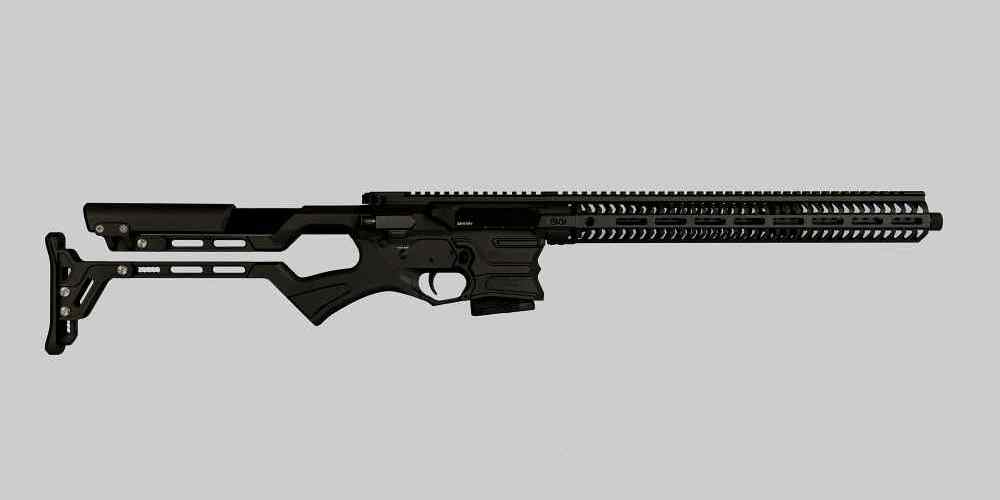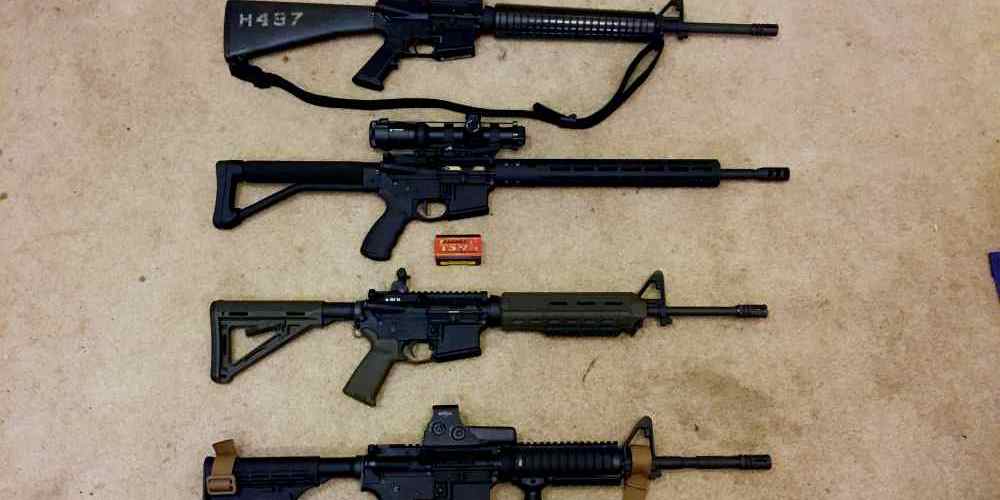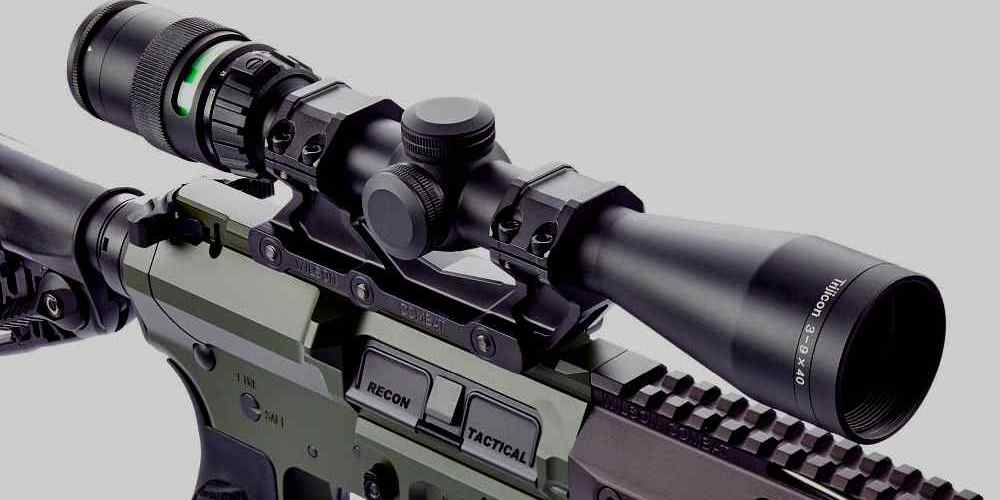“Short-barreled AR-15s: Compact firepower with trade-offs.”
Performance
When it comes to AR-15 rifles, one of the options that many gun enthusiasts consider is the short-barreled AR-15. These rifles have a barrel length of less than 16 inches, making them more compact and maneuverable than their full-sized counterparts. While short-barreled AR-15s offer some advantages in terms of handling and versatility, there are also some drawbacks to consider.
One of the main advantages of a short-barreled AR-15 is its compact size. The shorter barrel makes the rifle easier to handle in tight spaces, such as in a vehicle or in a home defense situation. This can be especially important for law enforcement officers or military personnel who may need to navigate through confined spaces while carrying their rifle.
In addition to their compact size, short-barreled AR-15s are also lighter than full-sized rifles. This can make them easier to carry for extended periods of time, such as during a long hunting trip or a day at the range. The reduced weight can also make the rifle easier to maneuver quickly, which can be important in fast-paced shooting situations.
Another advantage of short-barreled AR-15s is their versatility. The shorter barrel length does not significantly impact the rifle’s accuracy or range, making it suitable for a wide range of shooting activities. Whether you are hunting, target shooting, or using the rifle for self-defense, a short-barreled AR-15 can be a reliable and effective option.
However, there are some drawbacks to consider when it comes to short-barreled AR-15s. One of the main disadvantages is the reduced muzzle velocity that comes with a shorter barrel. The shorter length means that the bullet has less time to accelerate before leaving the barrel, which can result in lower muzzle velocity and reduced long-range accuracy.
Additionally, the shorter barrel length can also lead to increased muzzle blast and recoil. The shorter barrel does not have as much surface area to dissipate the gases produced by firing the round, which can result in a louder and more intense muzzle blast. This can be a concern for shooters who are sensitive to noise or who may be shooting in close quarters.
Another potential drawback of short-barreled AR-15s is the legal restrictions that may apply. In some states, owning a short-barreled rifle may require a special permit or tax stamp from the Bureau of Alcohol, Tobacco, Firearms and Explosives (ATF). This can add an extra layer of complexity and cost to owning a short-barreled AR-15.
In conclusion, short-barreled AR-15s offer some distinct advantages in terms of handling, versatility, and weight. However, they also come with some drawbacks, such as reduced muzzle velocity, increased muzzle blast, recoil, and potential legal restrictions. Ultimately, the decision to choose a short-barreled AR-15 will depend on your specific needs and preferences as a shooter. It is important to carefully consider the pros and cons before making a decision.

Concealability
When it comes to choosing a firearm for personal defense, concealability is often a key factor to consider. Short-barreled AR-15s have gained popularity in recent years due to their compact size and maneuverability, making them a popular choice for those looking for a versatile and powerful weapon. However, like any firearm, there are both pros and cons to consider when it comes to short-barreled AR-15s.
One of the biggest advantages of a short-barreled AR-15 is its compact size. With a shorter barrel length, these firearms are easier to maneuver in tight spaces, making them ideal for home defense or close-quarters combat situations. This can be especially important in urban environments where space is limited and quick target acquisition is crucial.
Additionally, the shorter barrel length of an AR-15 can also make it easier to conceal. Whether you are carrying concealed for personal protection or simply want to transport your firearm discreetly, a short-barreled AR-15 can be a more practical option than a full-size rifle. This can be particularly beneficial for those who live in states with strict gun laws or for individuals who prefer to keep a low profile when carrying a firearm.
On the other hand, there are some drawbacks to consider when it comes to short-barreled AR-15s. One of the main concerns is reduced accuracy at longer distances. The shorter barrel length can affect the velocity and trajectory of the bullet, leading to decreased accuracy when shooting at targets beyond a certain range. This can be a significant disadvantage for those who rely on their firearm for hunting or long-range shooting.
Another potential downside of a short-barreled AR-15 is increased recoil. With a shorter barrel, there is less surface area for the gas to act on, resulting in more felt recoil when firing the weapon. This can make it more difficult to control the firearm and may impact your ability to accurately place shots on target, especially in rapid-fire situations.
Despite these drawbacks, many gun owners still choose short-barreled AR-15s for their versatility and ease of use. With the right training and practice, it is possible to overcome the challenges associated with a shorter barrel length and take advantage of the benefits that these firearms offer.
In conclusion, the decision to purchase a short-barreled AR-15 ultimately comes down to personal preference and intended use. While these firearms offer increased concealability and maneuverability, they may also come with trade-offs in terms of accuracy and recoil. It is important to carefully weigh the pros and cons before making a decision and to seek out proper training to ensure safe and effective use of your firearm.
Legal considerations
Short-barreled AR-15s have become increasingly popular among gun enthusiasts in recent years. These compact firearms offer a number of advantages, but they also come with some legal considerations that potential buyers should be aware of.
One of the main benefits of a short-barreled AR-15 is its size. These firearms are much more compact than their full-sized counterparts, making them easier to maneuver in tight spaces. This can be especially useful in home defense situations, where a smaller firearm may be more practical than a larger one.
Another advantage of short-barreled AR-15s is their weight. Because they are smaller and lighter than full-sized rifles, they are easier to carry for extended periods of time. This can be a significant benefit for hunters or law enforcement officers who need to carry their firearms for long periods of time.
However, there are also some drawbacks to consider when it comes to short-barreled AR-15s. One of the main concerns is their reduced accuracy compared to full-sized rifles. The shorter barrel length can affect the velocity and trajectory of the bullet, which can result in decreased accuracy at longer ranges.
Another potential downside of short-barreled AR-15s is their reduced muzzle velocity. Because the barrel is shorter, the bullet has less time to accelerate before leaving the barrel. This can result in lower muzzle velocity, which can affect the overall performance of the firearm.
In addition to these performance considerations, there are also legal considerations to keep in mind when it comes to short-barreled AR-15s. In the United States, these firearms are regulated under the National Firearms Act (NFA), which imposes certain restrictions on their ownership and use.
One of the main requirements of the NFA is that individuals who wish to own a short-barreled AR-15 must first obtain a tax stamp from the Bureau of Alcohol, Tobacco, Firearms and Explosives (ATF). This process can be time-consuming and expensive, as the tax stamp typically costs several hundred dollars and can take several months to process.
In addition to the tax stamp requirement, owners of short-barreled AR-15s are also subject to certain restrictions on how they can use and transport their firearms. For example, these firearms are generally prohibited from being transported across state lines without prior approval from the ATF.
Despite these legal considerations, many gun enthusiasts still find short-barreled AR-15s to be a valuable addition to their collection. These firearms offer a number of advantages in terms of size and weight, and can be a practical choice for certain applications.
In conclusion, short-barreled AR-15s offer a number of advantages in terms of size and weight, but they also come with some legal considerations that potential buyers should be aware of. Before purchasing one of these firearms, it is important to understand the regulations that govern their ownership and use. By doing so, gun enthusiasts can ensure that they are in compliance with the law while enjoying the benefits of a compact and lightweight firearm.
Recoil management
When it comes to choosing a firearm for personal defense or recreational shooting, the AR-15 is a popular choice among gun enthusiasts. With its versatility, modularity, and ease of customization, the AR-15 platform has become a staple in the firearms community. One variation of the AR-15 that has gained popularity in recent years is the short-barreled AR-15. These compact rifles offer a number of advantages, but they also come with some drawbacks that shooters should consider before making a purchase.
One of the main benefits of a short-barreled AR-15 is its maneuverability. With a shorter barrel length, these rifles are easier to handle in tight spaces, making them ideal for home defense or close-quarters combat situations. The reduced overall length of the firearm also makes it more portable and easier to transport, whether you’re heading to the range or out on a hunting trip.
Another advantage of a short-barreled AR-15 is its weight. The shorter barrel and overall length of the rifle typically result in a lighter firearm, which can be beneficial for shooters who need to carry their rifle for extended periods of time. This can be especially important for hunters who may need to trek through rugged terrain or for law enforcement officers who need to carry their firearm on duty.
In addition to improved maneuverability and weight, short-barreled AR-15s also offer better recoil management. The shorter barrel length can help reduce felt recoil, making the rifle more comfortable to shoot for extended periods of time. This can be particularly beneficial for shooters who are sensitive to recoil or who are looking to improve their accuracy and follow-up shot speed.
However, there are some drawbacks to consider when it comes to short-barreled AR-15s. One of the main disadvantages is reduced muzzle velocity. The shorter barrel length can result in decreased bullet velocity, which can impact the rifle’s accuracy and effective range. Shooters may need to compensate for this by adjusting their shooting technique or ammunition selection.
Another potential downside of a short-barreled AR-15 is increased muzzle blast and noise. The shorter barrel can cause more gas and noise to be expelled from the muzzle, which can be distracting and uncomfortable for shooters. This can be mitigated with the use of a muzzle device or suppressor, but these additional accessories can add to the overall cost of the rifle.
Despite these drawbacks, many shooters find that the benefits of a short-barreled AR-15 outweigh the disadvantages. The improved maneuverability, weight, and recoil management make these rifles a popular choice for a variety of shooting applications. Whether you’re looking for a compact firearm for home defense or a lightweight option for hunting or competition shooting, a short-barreled AR-15 may be worth considering.
In conclusion, short-barreled AR-15s offer a number of advantages, including improved maneuverability, weight, and recoil management. However, shooters should be aware of the potential drawbacks, such as reduced muzzle velocity and increased muzzle blast. Ultimately, the decision to purchase a short-barreled AR-15 will depend on your specific shooting needs and preferences. Be sure to weigh the pros and cons carefully before making a decision.
Customization opportunities
When it comes to customizing your AR-15, the possibilities are endless. From different stocks and grips to optics and muzzle devices, there are countless ways to make your rifle truly your own. One option that has gained popularity in recent years is the short-barreled AR-15. These rifles have barrels that are less than 16 inches in length, making them more compact and maneuverable than their full-sized counterparts.
One of the biggest advantages of a short-barreled AR-15 is its size. With a shorter barrel, the overall length of the rifle is reduced, making it easier to handle in tight spaces or when moving quickly. This can be especially useful in home defense situations or when navigating through dense brush while hunting. Additionally, the reduced weight of a short-barreled AR-15 can make it more comfortable to carry for extended periods of time.
Another benefit of a short-barreled AR-15 is its improved maneuverability. The shorter barrel allows for quicker target acquisition and easier transitions between targets, making it ideal for competitive shooting or tactical applications. Additionally, the compact size of a short-barreled AR-15 can make it easier to store and transport, whether in a vehicle or in a backpack.
However, there are also some drawbacks to consider when choosing a short-barreled AR-15. One of the main concerns is reduced muzzle velocity. With a shorter barrel, the bullet has less time to accelerate before exiting the muzzle, resulting in lower velocities and potentially less accuracy at longer ranges. This can be mitigated to some extent by using specialized ammunition or compensators, but it is still something to keep in mind when choosing a short-barreled AR-15.
Another potential downside of a short-barreled AR-15 is increased muzzle blast and recoil. The shorter barrel can result in more muzzle blast and noise, which can be distracting or disorienting, especially in confined spaces. Additionally, the reduced length of the barrel can lead to increased felt recoil, making the rifle more difficult to control during rapid fire or follow-up shots. This can be addressed with the use of muzzle devices or recoil mitigation systems, but it is something to be aware of when considering a short-barreled AR-15.
In conclusion, short-barreled AR-15s offer a number of advantages in terms of size and maneuverability, making them a popular choice for many shooters. However, there are also some drawbacks to consider, such as reduced muzzle velocity and increased muzzle blast and recoil. Ultimately, the decision to choose a short-barreled AR-15 will depend on your specific needs and preferences. Whether you prioritize compactness and ease of handling or long-range accuracy and control, there are customization options available to help you tailor your rifle to your liking.





